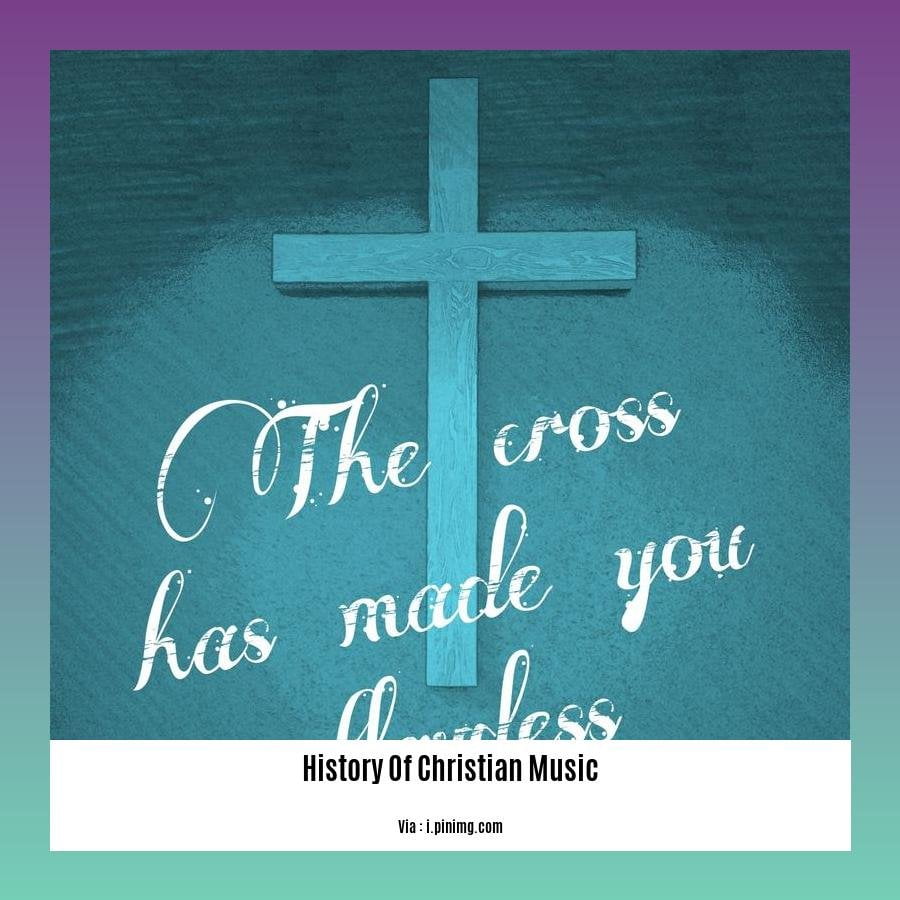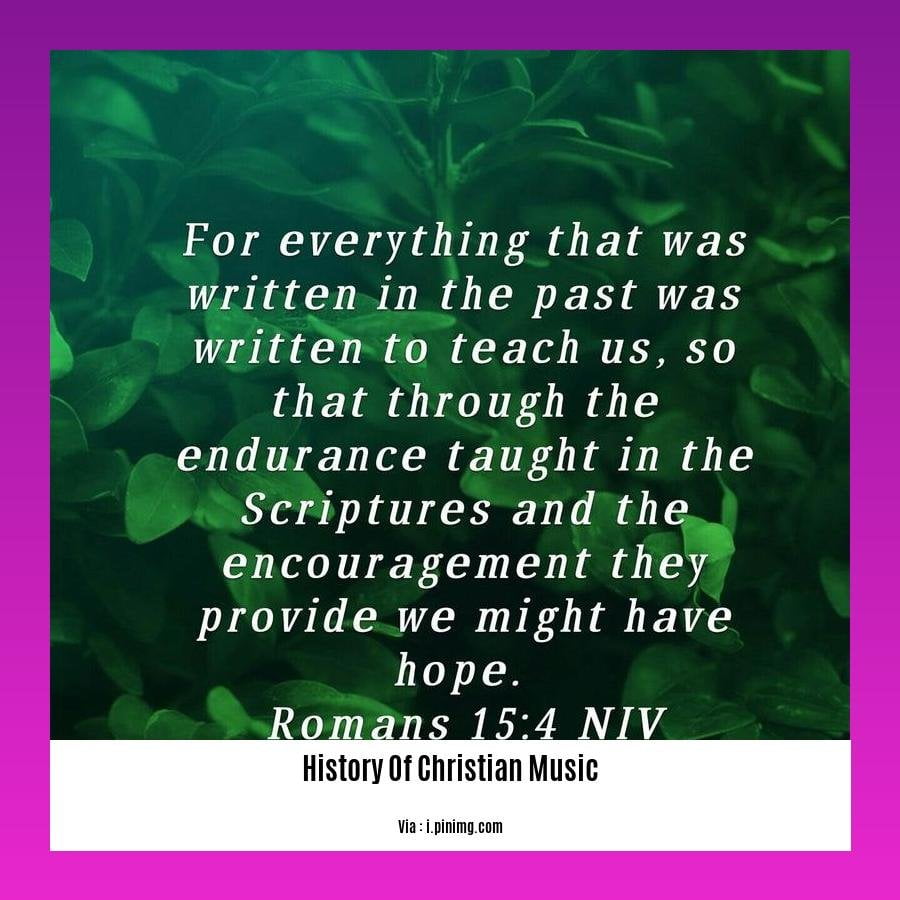Embark on a soul-stirring journey through the annals of Christian music with “Unveiling the Divine Melodies: A Journey Through the History of Christian Music.” Through this exploration, we’ll unravel the rich tapestry of hymns and anthems that have shaped the faith, tracing their evolution from ancient origins to contemporary expressions of worship. Prepare to be captivated by the power of music as we delve into its profound impact on the lives of believers across cultures and generations.
Key Takeaways:
The “Jesus Movement” of the 1970s led to the creation of a Christian music industry.
Larry Norman is considered the “father of Christian rock” for his pioneering work in the 1960s.
The 1990s saw a broad expansion of Christian music, including rock, rap, metal, urban gospel, contemporary country, and pop.
History of Christian Music

The history of Christian music is a rich and diverse one, spanning centuries and encompassing a wide range of styles and genres. From ancient hymns to contemporary worship anthems, Christian music has played a vital role in the faith and worship of believers worldwide.
Early Christian Music
The earliest forms of Christian music can be traced back to the early church, where believers gathered to sing hymns and psalms as a way of expressing their faith and devotion to God. These early hymns were often simple and straightforward, with lyrics that focused on the teachings of Jesus and the apostles.
Medieval and Renaissance Music
During the Middle Ages and Renaissance, Christian music began to develop and evolve, with the emergence of new genres and styles. One of the most significant developments of this period was the rise of polyphony, or the use of multiple melodic lines sung simultaneously. This led to the creation of more complex and elaborate musical compositions, such as masses and motets.
Reformation and Beyond
The Protestant Reformation of the 16th century marked a watershed moment in the history of Christian music. With the rise of Protestantism, there was a renewed emphasis on the importance of congregational singing, and new genres of music, such as chorales and hymns, began to emerge.
The 20th Century and Beyond
The 20th century saw a dramatic expansion in the scope and diversity of Christian music. The rise of electronic music and the increasing popularity of contemporary worship music led to the creation of new sounds and styles that appealed to a wider range of listeners.
Today, Christian music is a thriving and vibrant genre, with artists from all over the world creating music that reflects the diversity of the Christian faith. From traditional hymns to contemporary worship anthems, Christian music continues to play an important role in the lives of believers worldwide.
Key Figures in the History of Christian Music
- Ambrose of Milan: (c. 339-397) A bishop and theologian who is credited with developing the Milanese chant, one of the earliest forms of Christian music.
- Hildegard of Bingen: (1098-1179) A Benedictine abbess, composer, and visionary who wrote numerous hymns and other works of music.
- Martin Luther: (1483-1546) A German theologian and Reformer who wrote numerous hymns, including the famous chorale “A Mighty Fortress Is Our God.”
- John Wesley: (1703-1791) A founder of the Methodist movement who wrote numerous hymns, including the popular hymn “O For a Thousand Tongues to Sing.”
- Fanny Crosby: (1820-1915) A blind American hymn writer who wrote over 8,000 hymns, including the popular hymns “Blessed Assurance” and “Pass Me Not, O Gentle Savior.”
- Larry Norman: (1947-2008) An American singer-songwriter who is considered the father of Christian rock music.
- Amy Grant: (born 1960) An American singer-songwriter who is one of the most successful Christian music artists of all time.
- Michael W. Smith: (born 1957) An American singer-songwriter who is one of the most successful Christian music artists of all time.
You can learn more about how ceramic tiles became what they are today in the history of ceramic tiles, and as you prepare for the upcoming holidays, discover the background of the ornament that has become a staple for many Christmas trees in the history of Christmas baubles.
Hymns and Congregational Singing: Discuss the significance of hymns in the Christian tradition, highlighting the role of hymnody in shaping congregational worship and expressing theological beliefs.

Hymns have a remarkable history within Christian communities, serving as a pillar of worship and a medium for expressing theological beliefs. Their significance is deeply rooted in their ability to shape congregational worship, uniting believers in a shared spiritual experience.
The Power of Hymns in Congregational Worship:
Congregational singing of hymns is a potent form of worship, enabling direct communication with God. Through the shared act of singing, believers come together as a community, lifting their voices in unison to express their devotion and praise to the Almighty. Hymns create a sense of unity and belonging, fostering a powerful connection among the congregation.
Hymns as Theological Expressions:
Hymns have consistently played a crucial role in expressing theological beliefs within the Christian tradition. The lyrics of hymns often encapsulate the core teachings of the faith, presenting them in a memorable and accessible format. Hymns provide a means for believers to contemplate the mysteries of their faith, affirm their doctrinal convictions, and deepen their understanding of God’s character and attributes.
Hymns as Historical Narratives:
Hymns often serve as historical narratives, preserving the stories and experiences of the Christian faith across generations. They recount the lives of saints, describe pivotal moments in church history, and narrate the struggles and triumphs of believers. By singing these hymns, congregations connect to the rich tapestry of their faith’s past, gaining insight into the lives and beliefs of those who came before them.
Hymns as Cultural Expressions:
Hymns are cultural expressions, reflecting the unique heritage and traditions of different Christian communities. They incorporate elements of local culture, such as language, music, and rhythm, creating a rich and diverse tapestry of worship music that spans the globe. Hymns serve as a cultural bridge, connecting believers from various backgrounds in a shared experience of worship.
Hymns as a Source of Comfort and Inspiration:
Hymns are a source of comfort and inspiration for believers, particularly during times of adversity or personal struggle. The lyrics of hymns provide a sense of assurance, strength, and hope, reminding believers of God’s faithfulness and presence. Hymns have the power to uplift spirits, encourage hearts, and inspire believers to persevere in their faith journey.
Key Takeaways:
Hymns play a crucial role in shaping congregational worship by uniting believers in a shared spiritual experience.
The lyrics of hymns encapsulate the core teachings of the Christian faith, serving as theological expressions.
Hymns preserve historical narratives, recounting the stories and experiences of the Christian faith across generations.
Hymns are cultural expressions, reflecting the unique heritage and traditions of different Christian communities.
Hymns serve as a source of comfort and inspiration for believers, providing strength and hope during times of adversity.
Sources:
- The Value of Singing Hymns in Christian Worship
- Singing Hymns in Church – 4 Reasons You Should Keep Them
20th-Century Developments: Investigate the rise of contemporary Christian music, including the emergence of gospel, rock, and worship music, and its impact on Christian culture and worship practices.
In the 20th century, Christian music witnessed a transformation, transitioning from traditional hymns to diverse modern genres. Gospel, rock, and worship music emerged as powerful expressions of faith, reshaping Christian culture and worship practices.
Gospel’s Soulful Embrace
The 20th century marked the rise of gospel music, a genre that intertwined African American spirituals with elements of blues, jazz, and rhythm and blues. It took root in the Black church, emphasizing emotional expression and call-and-response vocals. Gospel reverberated with tales of hope, joy, and resilience, igniting a spiritual awakening within Christian communities. Artists like Sister Rosetta Tharpe, Mahalia Jackson, and The Soul Stirrers became iconic figures, leaving an indomitable mark on gospel’s legacy.
Rock’s Rebellious Revival
The 1960s witnessed the convergence of rock ‘n’ roll with Christian beliefs, giving birth to Christian rock. Fueled by the countercultural movement, Christian rockers like Larry Norman, Petra, and Amy Grant challenged traditional norms, addressing social justice issues and personal struggles through their music. Their rebellious spirit resonated with a generation seeking authenticity and a fresh perspective on faith, paving the way for rock’s enduring presence in Christian music.
Worship’s Heartfelt Expression
The late 20th century saw the emergence of worship music, characterized by its intimate and heartfelt expression of adoration for God. This genre emphasized personal connection, simplicity, and congregational participation. Worship music became a staple in contemporary Christian gatherings, creating an atmosphere of praise and reflection. Artists like Chris Tomlin, Hillsong United, and Bethel Music emerged as leaders in this genre, influencing the sound of worship music worldwide.
Key Takeaways:
- Gospel music emerged from the Black church, blending spirituals with blues, jazz, and R&B elements.
- Christian rock challenged traditional norms, addressing social justice and personal struggles through music.
- Worship music emphasized intimacy, simplicity, and congregational participation, creating a space for praise and reflection.
- Contemporary Christian music has revolutionized worship practices, catering to diverse styles and preferences.
- Its impact on Christian culture is undeniable, influencing everything from radio stations to concert tours.
Relevant Sources:
[^1^]: Gospel Music | Britannica
[^2^]: The History of Christian Music | Christianity.com
Theological and Cultural Impact: Analyze the profound influence of Christian music on theology, culture, and society, exploring its role in shaping Christian identity, fostering community, and conveying spiritual messages.
Christian music is a powerful force that has shaped theology, culture, and society for centuries. It has the ability to inspire, unite, and transform the lives of believers worldwide.
Music and Religion: A Divine Connection
Music has played a pivotal role in religious expression since ancient times. In Christian music, the lyrics and melodies combine to create a unique form of worship that transcends language and cultural boundaries. It serves as a vehicle for believers to express their love, devotion, and gratitude to God.
Theological Impact: Shaping Christian Identity
Christian music has profoundly shaped Christian theology and identity. Through hymns, choruses, and anthems, it has conveyed the core teachings of the Christian faith, including the life, death, and resurrection of Jesus Christ. These songs have helped shape the beliefs and practices of Christian denominations, fostering a sense of unity and belonging among believers.
Cultural Impact: Fostering Community and Cultural Expression
Christian music has also played a significant role in shaping culture. It has provided a platform for cultural expression, allowing Christians to share their stories, experiences, and traditions through music. Gospel music, for example, emerged from the African American community as a powerful form of cultural and spiritual expression.
Connecting with the Divine: The Power of Spiritual Messages
The lyrics of Christian music often carry deep spiritual messages that resonate with believers on a personal level. These songs can provide comfort, encouragement, and hope during times of difficulty, helping individuals connect with the divine and experience a sense of peace and joy.
Key Takeaways:
Christian music has a rich history that spans centuries and has evolved alongside the Christian faith.
It plays a crucial role in shaping Christian theology, conveying core teachings and beliefs through music.
Christian music fosters a sense of community and belonging, uniting believers from diverse backgrounds through shared worship experiences.
It serves as a powerful medium for cultural expression, allowing Christians to share their stories and traditions through music.
Christian music conveys deep spiritual messages that resonate with believers on a personal level, offering comfort, encouragement, and hope.
Citations:
- Music as a Trigger of Religious Experience: What Role Does Culture Play?
- The Relationship Between Music, Culture, and Religion: A Review of the Literature
FAQ
Q1: How did the “Jesus Movement” of the 1970s impact Christian music?
A1: The “Jesus Movement” sparked a significant shift in Christian music, leading to the rise of a thriving Christian music industry and the emergence of new genres like Christian rock.
Q2: Who is considered the “father of Christian rock,” and what was his contribution to the genre?
A2: Larry Norman is widely regarded as the “father of Christian rock.” He pioneered Christian alternative rock in the 1960s, paving the way for the development of the genre.
Q3: How did the scope of Christian music expand in the 1990s?
A3: The 1990s witnessed a remarkable expansion in the range of Christian music, encompassing diverse genres such as rock, rap, metal, urban gospel, contemporary country, and pop.
Q4: What role do hymns play in Christian worship, particularly in evangelical churches in Benin City, Nigeria?
A4: Hymns hold a crucial role in Christian worship, especially in evangelical churches in Benin City, Nigeria. They serve as a vital means of expressing devotion, praising God, and fostering a sense of unity among believers.
Q5: Why are traditional hymns facing a decline in interest among the youth, and what factors contribute to this trend?
A5: Traditional hymns are facing a lack of interest among the youth due to several factors, including the rise of contemporary worship music, which is perceived as more relatable and engaging by younger generations.
- Crypto Quotes’ Red Flags: Avoid Costly Mistakes - June 30, 2025
- Unlock Inspirational Crypto Quotes: Future Predictions - June 30, 2025
- Famous Bitcoin Quotes: A Deep Dive into Crypto’s History - June 30, 2025
















